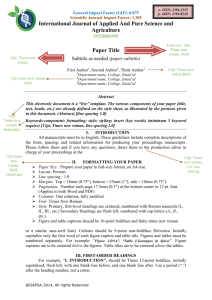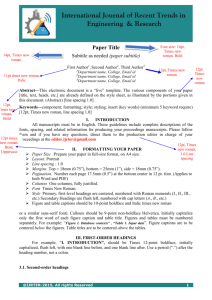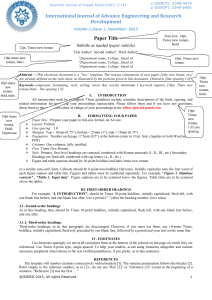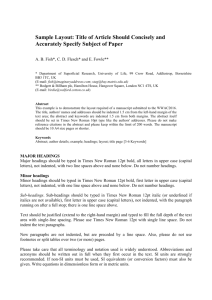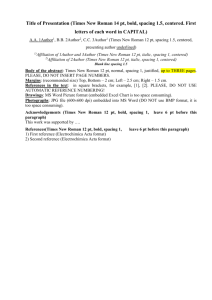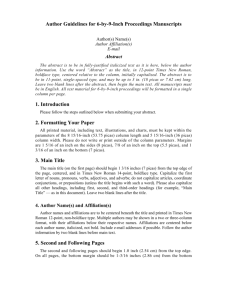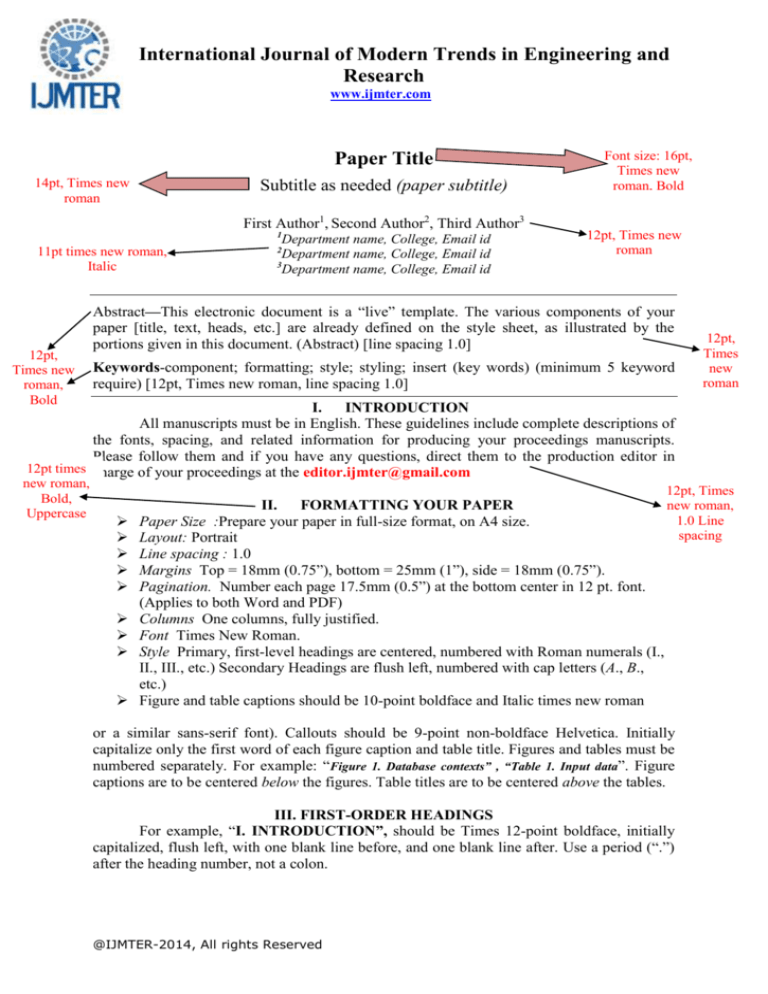
International Journal of Modern Trends in Engineering and
Research
www.ijmter.com
Paper Title
14pt, Times new
roman
Subtitle as needed (paper subtitle)
First Author1, Second Author2, Third Author3
1
11pt times new roman,
Italic
12pt,
Times new
roman,
Bold
Department name, College, Email id
Department name, College, Email id
3
Department name, College, Email id
2
Font size: 16pt,
Times new
roman, Bold
12pt, Times new
roman
Abstract—This electronic document is a “live” template. The various components of your
paper [title, text, heads, etc.] are already defined on the style sheet, as illustrated by the
portions given in this document. (Abstract) [line spacing 1.0]
Keywords-component; formatting; style; styling; insert (key words) (minimum 5 keyword
require) [12pt, Times new roman, line spacing 1.0]
12pt,
Times
new
roman
I. INTRODUCTION
All manuscripts must be in English. These guidelines include complete descriptions of
the fonts, spacing, and related information for producing your proceedings manuscripts.
Please follow them and if you have any questions, direct them to the production editor in
12pt times charge of your proceedings at the editor.ijmter@gmail.com
new roman,
Bold,
Uppercase
12pt, Times
II.
FORMATTING YOUR PAPER
new roman,
1.0 Line
Paper Size :Prepare your paper in full-size format, on A4 size.
spacing
Layout: Portrait
Line spacing : 1.0
Margins Top = 18mm (0.75”), bottom = 25mm (1”), side = 18mm (0.75”).
Pagination. Number each page 17.5mm (0.5”) at the bottom center in 12 pt. font.
(Applies to both Word and PDF)
Columns One columns, fully justified.
Font Times New Roman.
Style Primary, first-level headings are centered, numbered with Roman numerals (I.,
II., III., etc.) Secondary Headings are flush left, numbered with cap letters (A., B.,
etc.)
Figure and table captions should be 10-point boldface and Italic times new roman
or a similar sans-serif font). Callouts should be 9-point non-boldface Helvetica. Initially
capitalize only the first word of each figure caption and table title. Figures and tables must be
numbered separately. For example: “Figure 1. Database contexts” , “Table 1. Input data”. Figure
captions are to be centered below the figures. Table titles are to be centered above the tables.
III. FIRST-ORDER HEADINGS
For example, “I. INTRODUCTION”, should be Times 12-point boldface, initially
capitalized, flush left, with one blank line before, and one blank line after. Use a period (“.”)
after the heading number, not a colon.
@IJMTER-2014, All rights Reserved
International Journal of Modern Trends in Engineering and Research(IJMTER)
Volume XX, Issue XX, [Month - Year]
3.1. Second-order headings
As in this heading, they should be Times new roman 12-point boldface, initially capitalized,
flush left, with one blank line before, and one after.
3.1.1. Third-order headings.
Third-order headings, as in this paragraph, are discouraged. However, if you must use them,
use 12-point Times, boldface, initially capitalized, flush left, preceded by one blank line,
followed by a period and your text on the same line.
IV. FOOTNOTES
Use footnotes sparingly (or not at all) and place them at the bottom of the column on
the page on which they are referenced. Use Times new roman 8-point type, single-spaced. To
help your readers, avoid using footnotes altogether and include necessary peripheral
observations in the text (within parentheses, if you prefer, as in this sentence).
REFERENCES
The template will number citations consecutively within brackets [1]. The sentence
punctuation follows the bracket [2]. Refer simply to the reference number, as in [3]—do not
use “Ref. [3]” or “reference [3]” except at the beginning of a sentence: “Reference [3] was the
first . . .”
For papers published in translation journals, please give the English citation first, followed
by the original foreign-language citation [6].
Format of Reference
[1] Author1, Author2, "Paper Title", Journal Name with Issue number, Page Number, Year of
Publish
Example:
S. M. Metev and V. P. Veiko, Laser Assisted Microtechnology, 2nd ed., R. M. Osgood, Jr., Ed. Berlin,
Germany: Springer-Verlag, 1998.
[2] J. Breckling, Ed., The Analysis of Directional Time Series: Applications
to Wind Speed and Direction,
ser. Lecture Notes in Statistics. Berlin, Germany: Springer, 1989, vol. 61.
[3] S. Zhang, C. Zhu, J. K. O. Sin, and P. K. T. Mok, “A novel ultrathin elevated channel low-temperature
poly-Si TFT,” IEEE Electron Device Lett., vol. 20, pp. 569–571, Nov. 1999.
[4] M. Wegmuller, J. P. von der Weid, P. Oberson, and N. Gisin, “High resolution fiber distributed
measurements with coherent OFDR,” in Proc. ECOC’00, 2000, paper 11.3.4, p. 109.
[1]
@IJMTER-2014, All rights Reserved
2

